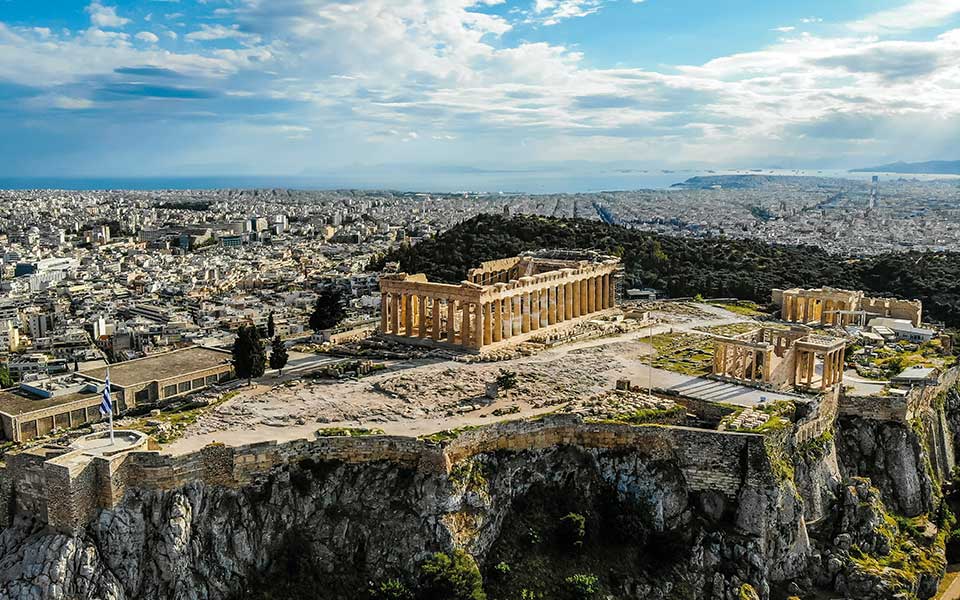Disability in Ancient Greece: Myths, Facts, and Accessibility...
Professor Debby Sneed explores disability in...

The stunning Acropolis, an aerial view from the east, with the Old Acropolis Museum (L), the Parthenon (C), and the Erechtheion and Propylaia (R).
© Ministry of Culture and sports/Ephorate of Antiquities of the city of Athens, photo: Getty Images/Ideal image
In these times of lockdown, what better way to prepare for your next trip to Greece than by grounding yourself in ancient Greek history through YouTube!
Below are our top ten videos on ancient Greek civilization, offering insights into history, philosophy and lots, lots more.
Arzamas Academy, 2017
Humorous, fast-paced, very informative but sometimes glosses over important details and makes gobsmacking generalizations. Excellent graphics that are sometimes laugh-out-loud funny! Reminds you that the Greeks are ultimately behind everything familiar and important in European and Western culture – great architecture, democracy, orthogonal city planning and wine! Narrated by Brian Cox.
NOVA, 2008; 53 mins
A classic documentary, with interview clips and on-site information from top specialists, atmospheric music, panoramic views, intriguing reconstructions and fascinating explanations of the hidden details behind the original construction. You will learn about the “optical refinements” as well as the current restoration of the Parthenon, “a majestic ruin, a witness to what we needlessly destroy, and to the beauty and perfection we can create.”
Acropolis Museum, 2010; 9 mins
Aerial, exterior and interior views of the Acropolis Museum and its many impressive displays of ancient Greek art and architecture. Strong narration and bold, clean photography that brings details of the sculptures and strikingly modern building into sharp focus, much like the museum’s glossy museum guide brought to life in a film.
Smarthistory, 2015; 14 mins
A guided tour of the Parthenon’s decorative sculpture in the British Museum, with art historical analysis and commentary by art historians Steven Zucker and Beth Harris. Beginning with an introduction to ancient Athens and its Classical acropolis, the presenters’ clear, conversational narrative is richly informative, authoritative and engaging. The graphics are excellent and ultimately you’re left with a deeper appreciation for the exquisite artistry of the sculpted works.
National Geographic, 2018; 4 mins
A bit more pedagogical, but only four minutes long. 1,500+ independent Greek city-states! Who knew? No wonder they were always fighting! This mini “course” focuses on the achievements and legacy of the ancient Greeks’ “legendary civilization,” including its art, architecture, philosophy, democracy, religion, the Olympics, Greek language and “global” military expansionism.
TED-Ed, 2016; 5 mins
Philosophy explained: the world according to Plato, co-founder (with Aristotle) of political science, but who didn’t always get it right. An animated short for older students and adults.
Epic History TV, 2017; 53 mins
A four-part history of Alexander the Great all in one video. Masterful animation, more like detailed illustrations or a state-of-the-art computer game. Colorful maps and battle diagrams lay out the course and successful strategies of Alexander’s army, covering a decade of trans-Asia campaigning in less than an hour. Follow along through victories at Granicus, Issus, Gaugamela, Jaxartes and the Hydaspes River, as Macedonia’s forces push on into Parthia (Iran), Bactria and Aria (Afghanistan) and Sogdiana (Tajikistan); cross the Hindu Kush Mountains into the Indus River valley; and conquer Assacenian Massaga (Pakistan) and the Punjab (NW India). From Babylon, Alexander’s body was sent home, but hijacked to Egyptian Alexandria.
Timeline, 2003; 2h 23 mins)
Part 2: (47:30 mins)
Part 3: (48 mins)
A three-part documentary that relates the saga of the Greek Classical era through the eyes of the Spartans, not the usual Athenians. Historian Bettany Hughes guides you on what feels like a personal tour of numerous archaeological and natural sites, making the past fascinating and impressive, as she hikes, drives, scales, scrambles down into and gallops across Greece and Sicily’s inspiring landscapes. Highlights include “300”-style Spartan clashes and dancing black-figure vase paintings. A memorable quote on Sparta’s decline: “To end up as a purveyor of sado-tourism to a bunch of Romans is a fate even the gloomiest of oracles would not have predicted.”
Part 1: Earliest times, Battle of Thermopylae, Spartan males’ life and rituals; Part 2: Rise of Athens, Spartan women’s life and rituals, Peloponnesian War to Battle of Sphacteria Island; Part 3: Delphic oracles, Sicilian Campaign, Alcibiades, Sparta’s decline, Battle of Leuctra, helots’ founding of Messene.
PBS, 2000; 2h 20 mins
Grand style, cinematic reenactments, rich visuals, dramatic readings from ancient literature, all narrated by Liam Neeson. The Golden Age of Athens of the 5th and 4th centuries BC, ending with Plato and Aristotle. Commentary by a host of British and American scholars. Educational, detailed, refined, sometimes deeply moving in its storytelling (e.g. the death of Socrates). Athens ultimately evolved from a center of military valor to a city of intellectual inquiry, as it began to build a world based on reason.
2017; 14 mins
Not just geography. It’s all here, delivered in a rapid-fire assault of details, images and surprisingly accurate characterizations. This tongue-in-cheek overview is fast, furious and funny, right to the end. The history part goes by so quickly, you can feel your head spinning. Demography, volcanism, economic statistics, inventions, customs, common sights, regional relations, among others, all mixed with archaeological sites and diverse touristic destinations.
Narrated by the engaging “Barby” (“Paul B.”), who cracks himself up; offers good advice (“avoid the offensive Moutsa hands!”) and amusing insights (“You’ll probably hear a lot of lutes, mandolins and tambourines”); deserves an award for the worst pronunciation of Greek names – “Halki-deeki” [Chalkidiki], “Hera-Cleon” [Irakleio], although “peeta with yeeros” [pita-gyros] came out pretty well. And it reminds us that “If you’ve never had Greek food, you’re not allowed to die until you do.”
Professor Debby Sneed explores disability in...
As Greeks gather for their Tsiknopempti...
Explore Ancient Messene, enjoy the local...
The Kerameikos archaeological site provides a...